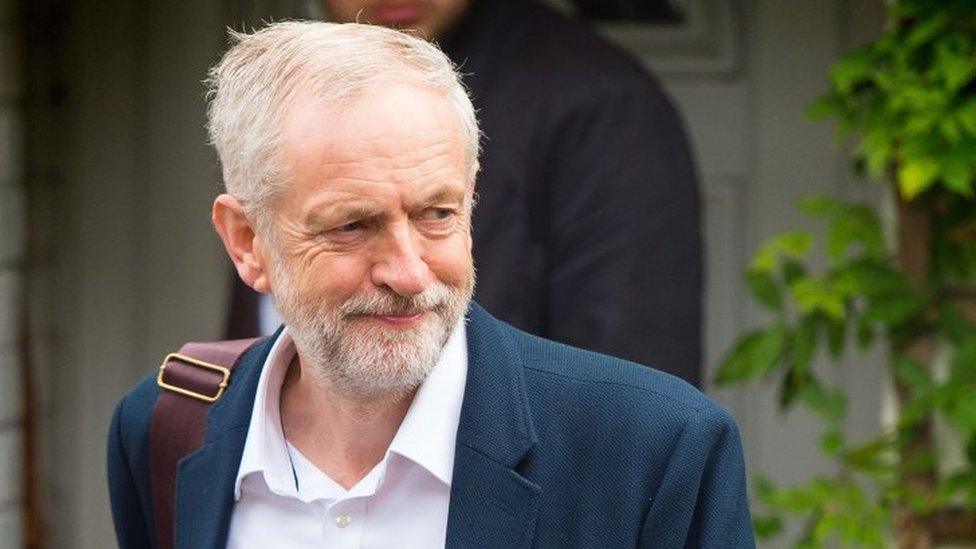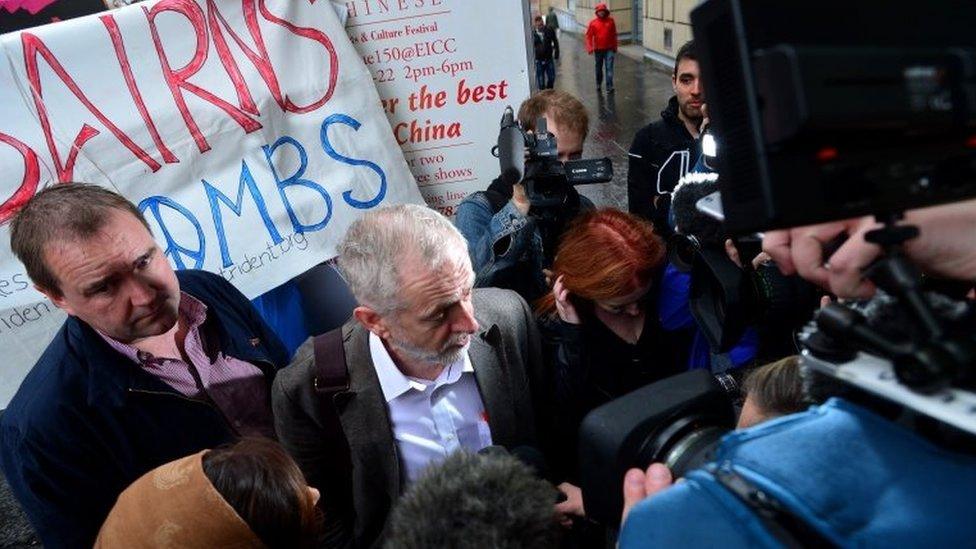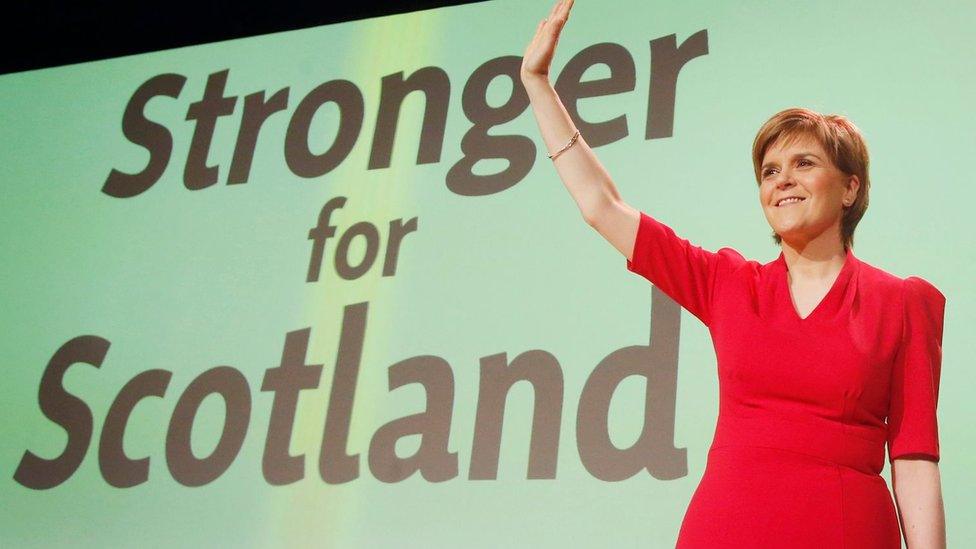Looking back, looking forward
- Published

Looking back, looking forward. Such are the responses stirred by two current political phenomena: the election of Jeremy Corbyn to lead the Labour Party and the anniversary of the independence referendum.
Of course, the two may intermingle. Support for the Labour Party in Scotland will now hinge substantially - although by no means entirely - upon perceptions of Mr Corbyn, however frequently and vehemently Kezia Dugdale may remind us that she leads the party north of the Border.
Can Scottish Labour revive - and thus dent SNP success? If they can, would that have a concomitant effect upon support for independence, remembering always that the two factors - the SNP and its core policy - are not necessarily coterminous.
Alternatively, will Jeremy Corbyn further damage Scottish Labour's prospects - if such a scenario is feasible - and bolster the confidence of the SNP, perhaps enhancing the prospect of a less-than-distant second referendum?
Internal divisions
The thinking - OK, the flickering hope - in Scottish Labour circles is that, at the very minimum, Mr Corbyn's elevation allows the party in Scotland to posit itself as distinctly to the Left of the SNP. Or, more precisely, offers evidence to that effect.
Then, again, continuing division within Labour, if such emerges, can only benefit the party's opponents: the SNP in Scotland, the Conservatives and, mayhap, the Liberal Democrats across Britain.
As one senior insider put it to me: "Brian, either this is the making of us in Scotland. (Long pause) Or, alternatively, we're completely f….d."
Consider also the offer from the SNP's deputy leader Stewart Hosie to work with Corbyn Labour to defeat the UK Conservative Government on key issues, such as Trident.
While perhaps looking forward to that, sensible analysts would also look back. To the days when Greeks were bearing gifts (rather than accepting them, unwillingly.)
They might also see Mr Hosie's offer as a modern strategic form of old-style Trotskyite impossibilism. Set Labour a challenge, aware that their internal divisions point towards failure. Condemn them duly when that failure occurs.
Undiluted Socialism
To be clear, I am not remotely criticising Mr Hosie or the SNP in this regard. The strategy is perfectly sensible. But look at the nature of his offer - which is to work with Labour to achieve objectives which currently depart from that party's previously existing policy. He is, in short, poking a stick at Labour's potential divisions - while offering unity.
To basics. Might Jeremy Corbyn be popular? Certainly, he won a comprehensive victory - for which he is due congratulations. He drew thousands to the party. He attracted support from 250,000 people.
Which sounds impressive - and, historically, it is stunning - until one reflects that the UK electorate is more than 45 million.
Mr Corbyn's platform is robustly of the Left. He has entrenched that by naming John McDonnell as his shadow chancellor, while also seeking a degree of balance within his team. A degree limited by the fact that a number of erstwhile front benchers have declined to serve.
He has been compared with Michael Foot who led Labour to defeat in 1983. But Michael Foot had served in cabinet before becoming leader. Mr Corbyn has not troubled the front benches during 32 years in the Commons. Since that 1983 defeat, in fact.
Further, Michael Foot was an outstanding parliamentarian and one of the finest orators of his generation. Even Mr Corbyn's staunchest supporters would concede that his speech-making is perhaps a fraction shy of Ciceronian.

But maybe the voters are fed up with politics as previously practised. Perhaps they are fed up with spin and triangulation. Perhaps they will warm to Mr Corbyn's blend of undiluted Socialism.
Certainly, his opponents would be wise not to sound too smart in coping with him, not to sound too patronising. Some voters may see his honesty as refreshing, even if they feel he is honestly wrong.
Glance back through history. Jeremy Corbyn is a Leveller, a Chartist. There is even a fair dose of Citizen Smith in there; his flagging lapel weighed down by badges proclaiming a range of Leftist causes.
His personal message will be anti-Trident and, above all, anti-austerity. At first glance, that may prove popular among sections of the electorate in Scotland who were attracted to the SNP - although the swing to the Nationalists was as much prompted, in my view, by a sense that they stood for Scotland, ineluctably.
Second referendum
However, politics develops. How will Mr Corbyn's offer on the economy stand up against the argument by the Conservatives and, thus far, by Labour that the UK's deficit must be tackled (with the debate being over the timetable?)
Further, how will he be seen as a potential Prime Minister? Mr Corbyn had a fair degree of justice on his side when he argued during the leadership campaign that the focus should be upon policies, and not personal insults or abuse.
But that only goes so far. People are not just electing a manifesto. They are not electing an automaton who will simply look up the relevant paragraph when confronted with an emerging problem in government.
They are electing a leader. Politics may not be about "personality" in the customary glib sense. But it is about character: the capacity to lead, the ability to react to developing events, the facility to apply sense and sensitivity to domestic and global challenges which were not foreseen when the election was fought.
Mr Corbyn will be tested - and rightly tested - on all these factors. The voters will decide their response in due course.

As may be the case with a further independence referendum. There is now much speculation as to the triggers which might prompt a second plebiscite.
Nicola Sturgeon herself has said that British exit from the European Union, without Scottish consent, might be one such trigger. Others have suggested: added austerity; the upgrading of Trident; the failure to deliver more powers for Holyrood in line with promises.
For myself, I think that the first issue - Brexit - is in rather a different category from the others. It would involve a specific decision by the people of these islands - and would be posited upon the prospect that Scotland voted a different way. Hypothetical upon hypothetical - but, in each case, predicated upon the future.
'Material change'
The other possible triggers, to varying degrees, rest upon pre-existing politics. Even the Trident replacement has already been signalled in principle.
No matter. There is one over-riding trigger. One element which will trump the rest in Ms Sturgeon's calculations. One factor which explains the FM's caution.
Nicola Sturgeon does not want to hold a referendum. She wants to win a referendum. She knows that returning to the people too soon might risk a further defeat. What, some might ask, happened to "once in a generation" or "once in a lifetime"? Were you not listening the last time when we said "No"?
So Ms Sturgeon would want circumstances to be more satisfactory from her perspective. She would want a string of polls suggesting solid support for "Yes". She would want sustained stability in the economy - remembering always that the SNP's offer is not based upon fright but upon potential strength. Ideally, she would want a higher oil price.
So I hold to the view, expressed here previously, that the SNP manifesto for next May's Holyrood elections is likely to say that there is no immediate plan for a rerun referendum - but that the party reserves the right to hold such a ballot in the event of "material change".
For Nicola Sturgeon, for Jeremy Corbyn, politics does not operate in a vacuum, in a silo. It operates via public support, public tolerance, driven by a series of interconnecting factors. Rarely pure and never simple.